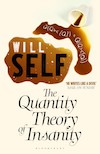Listen to Will Self reading his short story “The North London Book of the Dead” on Radio 4 here until 9 May. It was first broadcast in 1995.
New Bloomsbury book covers
Greg Heinimann at Bloomsbury has created a series of new book covers for Will Self’s back catalogue to coincide with the paperback publication of Walking to Hollywood (below) in September. The new covers are for My Idea of Fun, The Quantity Theory of Insanity, Cock & Bull, The Sweet Smell of Psychosis, Junk Mail, Grey Area, Great Apes and The Butt.
Read a short report about it in Creative Review here.
David Eagleman talk
At the Conway Hall (conwayhall.org.uk) in central London, on March 25, Will Self was in conversation with David Eagleman, the neuroscientist and author of Sum: Forty Tales from the Afterlives. It was a case of an eager Eagleman versus a stoical Self.
Sum’s 40 mutually exclusive stories are, said Eagleman, a critique of certainty, a “meta-message” shining a flashlight around the “possibility space”. Self gently ribbed Eagleman on his neologism of “possibilianism”, which he said didn’t exactly trip off the tongue and that, besides, it reminded him of the word bilious. He told him he preferred his own coinage – “radical agnosticism”.
Self admitted at the beginning of the talk that “It’s a drag that we’re more or less in agreement” in terms of a debate, and clearly Self was more interested in any epiphany that Eagleman might have had, or any emotional backstory to the book. In that regard, Sum turns out to have more of an intellectual inspiration.
Self talked about the shock of nursing his dying mother when he was still in his 20s and of her death, and that it was this epiphany, along with the birth of his first child, that propelled his writing, starting with the short story The North London Book of the Dead from The Quantity Theory of Insanity: “I saw myself becoming a neutered bachelor, who would be wearing a cardigan and still living at home at the age of forty, but it wasn’t to be.”
Self said he saw Sum as a book very much about this life rather than the afterlife. Intriguingly, Self also suggested that the Dignitas-inspired story Leberknödel, from Liver, could be viewed as an afterlife story too.
To watch the whole talk, visit the Intelligence Squared website here.
There is also a review on the New Scientist website here.
The Quantity Theory Of Insanity – Amazon.com Reader Reviews
11 reader reviews
“Will Self’s ‘The Quantity Theory of Insanity’ overflows with (unsurprisingly) dark humor mixed with academic flair. The stories often seem to lack a clear and definitive finishing point, as if one is reading a manuscript of a story half-written. This, of course, may be a purposeful attempt; that by not offering conclusion, Will Self is in essense prodding the reader into personal deliberation over the concepts presented. Unfortunately, if this be the case, these same concepts have seen so much activity in modern psychology that for the author to not thoroughly conclude his own insights leads one not into pondering personal beliefs in the matter, but what the author might have been trying to convey. A fruitless task as Self, undoubtedly, tries to be as enigmatic as possible.” – James F.
The Quantity Theory Of Insanity – Amazon.co.uk Reader Reviews
13 reader reviews
“After reading this I found it difficult to work out if Self had entered my mind and shaken it all about or if I had entered his and lost mine somewhere within the process.In a similar way that Burroughs expertly projected his subject matter in Naked Lunch, Self takes us on an hilarious, nerve-wracking and exhausting journey through his mind and the minds of his characters, which ultimately leads to your head imploding around about the same time as it explodes. I have never laughed or cried so much at one sitting, nor have my ears bled for so long. Exquisite. ” – Mr Papillion
Tough Tough Toys For Tough Tough Boys – Amazon.com Reader Reviews
7 reader reviews
“Will Self borrows a gimmick used by Kafka, Borges, and in one not-very-succesful story by Fitzgerald (A Diamond as Big as the Ritz) and, to some extent, used in all science fiction. An impossible or supernatural event is treated naturalistically, or accepted deadpan without comment by the characters.(Isaac Asimov Magazine stories do this well).
Another trademark, reminiscent of the dirty Scottish shock-writers, is descriptions of drug and alcohol use from the point of view of the user. He also favors effects that used to be called Grand Guignol and are now called splatterpunk.
These devices are used as the hinges of his plots and the entertainment values of his stories often depends on how compelling you find them. Apart from them he is a witty and perceptive satirist with some wonderful prose such as his description of the small Suffolk town “landlocked by the shifting dunes of social trends” where “the landlords of the three desultory pubs on the main street drew pints for themselves in the cool, brown, afternoon interiors of their establishments.” – D.P. Birkett


